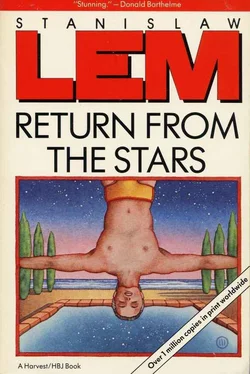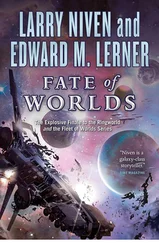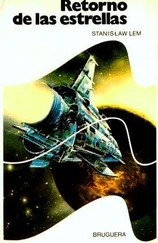The book ended with a chapter on the possibilities of exploration with the aid of robots. Robots, too, would transmit dead information, but this approach would at least avoid human sacrifices.
And there was a three-page appendix, an attempt to answer the question of the possible existence of travel faster than light, and even of the so-called instantaneous cosmic conjunction, that is, the crossing of space with little or no passage of time, thanks to still-undiscovered properties of matter and space, through a sort of “hyperjump"; this theory, or, rather, speculation, not based on any facts to speak of, had a name — teletaxis. Starck believed that he had an argument to cancel this last remaining hope. If such a thing existed, he maintained, undoubtedly it would have been discovered by one of the more highly developed civilizations of our or another galaxy. In which case, the representatives of that civilization would have been able, in an incredibly short time, to visit in succession every planetary system and sun, including our own. But Earth had not experienced any such visit so far, which was proof that this lightning-fast method of penetrating the cosmos could be imagined but never turned into reality.
I went back to the house stunned, with the almost childish feeling that I had been personally injured. Starck, a man whom I had never met, had dealt me a blow as no one else ever had. My clumsy summary does not convey the ruthless logic of his reasoning. I do not know how I got to my room, how I changed my clothes — at one point I felt like having a cigarette and realized that I was smoking one already, sitting hunched on my bed as if I were waiting for something. True: lunch. Lunch for three. The fact was, I was afraid of people. I had not admitted this to myself, but that was why I had agreed so hurriedly to share the villa with strangers; perhaps anticipation of their arrival was even the reason for my unnatural haste, as if I had been working to get ready for their presence, to initiate myself, through the books, into the mysteries of the new life. I would not have considered this in the morning of that day, but after Starck’s book my nervousness suddenly fell away from me. From the reading apparatus I removed the seedlike bluish crystal, and in awe placed it on the table. This was what had sent me reeling. For the first time since my return I thought of Thurber and Gimma. I would have to see them. Maybe the book was right, but we represented a different truth. No one had the whole truth. That was not possible. I was roused from my trance by the musical signal. I straightened my sweater and went downstairs, in control of myself, already calmer. The sun streamed through the vines of the veranda; the hall, as always in the afternoon, was filled with a diffuse greenish glow. On the table in the dining room lay three settings. As I entered, the door opposite opened and they appeared. They were tall by present standards. We met in the middle of the room, like diplomats. I gave my name, we shook hands and sat at the table.
A numbness possessed me, like that of a boxer who has picked himself up off the floor after a technical knockout. From my depression, as from a theater box, I looked at the young couple. The girl was probably not even twenty. I was to conclude, later, that she did not lend herself to description; she certainly would not resemble a photograph of herself — and even on the second day I had no idea what kind of nose she had, straight or upturned. The way she held out her hand for a plate delighted me like something precious, a surprise that did not happen every day; she smiled rarely and with composure, as if slightly distrustful of herself, as if she felt she was insufficiently self-possessed, too merry by nature or maybe too willful, and she judiciously tried to remedy this, but her strictness toward herself was constantly being undermined, she knew of it, and it even amused her.
She drew my gaze, and I had to fight this. Every moment I was staring at her, at her hair, which challenged the wind; I bowed my head over my plate, I glanced furtively, reaching for a dish, so that twice I nearly knocked over a vase of flowers; in other words, I made a perfect ass of myself. But it was as if they did not see me at all. Their eyes were only for each other, and invisible threads of comprehension linked them. During the entire time I am sure we exchanged no more than twenty words, about how the weather was good, the place was nice, perfect for a vacation.
Marger was no more than a head shorter than I but was as slender as a boy, although he must have been thirty. He wore dark clothing, was blond, and had a long face and a high forehead. At first he seemed exceptionally handsome, but that was only when he kept his face immobile. He hardly said a word to his wife; when he did, usually with a smile, the conversation consisted of allusions and hints, completely cryptic to an outsider, and he became almost ugly. Not ugly, exactly. It was as if his facial proportions deteriorated; the mouth bent a little to the left and lost its expression, and even his smile became neutral, although he had beautiful white teeth. And when he was animated, the eyes were too blue, the jaw too pronounced, and altogether he was like an impersonal model of masculine charm, out of a fashion magazine.
In other words, from the first I felt an aversion to him.
The girl — I could not think of her as his wife, no matter how I tried — did not have pretty eyes or lips, or unusual hair; she had nothing unusual. She was in her entirety unusual. With one like her, carrying a tent on her back, I could cross the Rockies twice, I thought. Why mountains, exactly? I didn’t know. She brought to mind nights spent in pine forests, the labor of scaling a cliff, the seashore, where there is nothing but the sand and the waves. Was this only because she wore no lipstick? I felt her smile, felt it across the table, even when she was not smiling at all. Then, in a sudden rush of boldness, I decided to look at her neck — as if committing a theft. This was near the end of the meal. Marger turned to me unexpectedly; I believe I blushed.
He had been speaking for some time before I caught the sense of what he was saying: that the house had only one gleeder, that he, unfortunately, had to take it, because he was going to the city. Therefore, if I, too, intended to go and did not want to wait until evening, perhaps I would accompany him? He could, of course, send me another gleeder from the city, or…
I interrupted him. I started to say that I had no intention of going anywhere, but I checked myself, as if I had remembered something, then heard my own voice saying that indeed I had planned to travel to the city and if he didn’t mind…
“Well, then, that is perfect,” he said. We got up from the table. “What time would be most convenient for you?”
We stood on ceremony awhile, then I got him to admit that he was in something of a hurry, and I said that I could go at any time. We agreed to leave in half an hour.
I went back upstairs, confounded by this turn of events. He meant nothing to me. And there was absolutely nothing that called me to the city. What, then, was the point of this escapade? I had the impression, besides, that his politeness toward me was a bit exaggerated. Anyway, if I had really been in a hurry to get to the city, the robots certainly would have seen to it. I would not have had to go on foot. Did he want something from me? But what? He didn’t know me from Adam. I was puzzling over this, again for no good reason, when the agreed-upon time arrived and I went downstairs.
His wife was nowhere to be seen, nor did she appear at the window to say good-bye to him once more. Inside the spacious machine we were silent at first, watching curves appear as the road snaked among the hills. Slowly a conversation was struck up. I learned that Marger was an engineer.
Читать дальше











